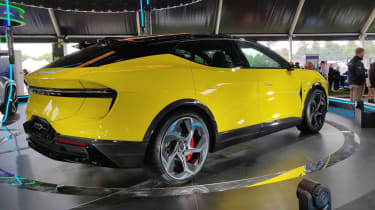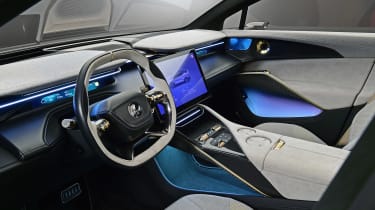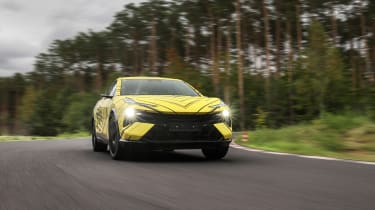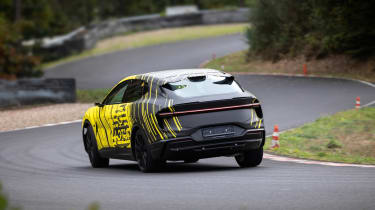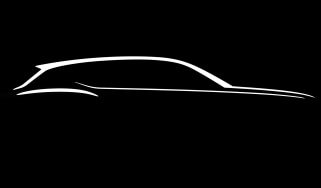2023 Lotus Eletre prices, specs and performance figures announced
The new Lotus Eletre SUV promises to be the fastest all-electric SUV on the market
Lotus has revealed more details of its Eletre SUV, the series-production model that will transform the small British sports car maker into a high performance electric vehicle manufacturer. Launching in the UK next year with prices starting from £89,500 and rising to £120,000 for the flagship Eletre R, it’s priced above potential rivals like the BMW iX, but comes with more kit and more performance to compensate.
The Eletre is the first Lotus to have been designed and developed on a truly global scale utilising all of the firm’s existing and recently created development centres, from its new technology centre in Wellsbourne, Warwickshire, to new R&D centres in both Sweden and Germany and, of course, Hethel. It will also be the first Lotus to be built outside of the company’s Norfolk home, with a new technology campus (they don’t really call them factories anymore) in Wuhan, China. Deliveries will start next year for markets in the UK, Europe and China.
> Radford Lotus Type 62/2 makes Goodwood FoS debut
Lotus has developed a new platform on which to build the Eletre, called Electric Premium Architecture (EPA). Once this SUV is up and running it will be further developed to create a Porsche Taycan rivalling saloon/GT car, and an all-electric sports car in the spirit of the Elise, which will also form the basis for a new Alpine electric sports car.
The Eletre’s skeleton is an aluminium and steel architecture that integrates an 800 volt, high-voltage network with the tailor made battery pack developed by Lotus Tech and China that optimises cell density and charging efficiency. Together with the battery packaged between the front and rear axles are a pair of electric motors positioned at either end, giving the Eletre four-wheel drive capability. The motors, controller and reducer are integrated into a single three-in-one package to optimise weight and reduce the overall size of the powertrain.
Lotus will launch the Eletre with a three-model offensive, split into Eletre, Eletre S and Eletre R models. Between the three models there will be two powertrain options combined with a single battery capacity, which has now been confirmed to be 112kWh. Utilising its 800V electrical hardware, it’s capable of charging at up to 350kW which can replenish the battery pack from 10 to 80 per cent 20 minutes.
In terms of power, the Eletre and Eletre S comes with a dual motor setup that’s capable of producing 603bhp, with torque rated at 523lb ft. Lotus claims that these two models will reach 62mph in 4.5sec, and do the 50mph-80mph burst in ‘under 2.2sec’. Top speed is rated at 160mph, and when fitted with the optional 20-inch wheels (all UK cars come with larger 22s) it’ll do an estimated 373 miles on the WLTP cycle.
Eletre R models up the ante with a much more powerful 905bhp system, paired to a peak 726lb ft of torque. Its 0-62mph time is reduced to 2.95sec, which Lotus says makes it the fastest all-electric SUV on sale. Its 50mph-80mph time is also down to ‘under 1.9secs’, and tops out at 165mph. Its range as a consequence has taken a hit, now rated at 304 miles.
Lotus has remained tight-lipped about specifics of the Eletre R’s upgraded powertrain, but has confirmed that it features a two-speed transmission in contrast to the base option’s fixed speed powertrain, likely referring to the rear motor.
All Eletre models will utilise air suspension, with active ride height control and active aero also included. Adaptive dampers, rear-axle steering, electric active anti-roll bars and torque vectoring via an electronic limited slip diff will also be available. As is all the rage, huge 23-inch wheels and carbon ceramic brakes will also make their way onto the options list, but all UK cars will come standard with 22s. Optional range-increasing 20s are also available on the base and S models.
Four drive modes will be included on all three variants: Range, Tour, Sport, Off-Road and a further Individual mode allowing a level of influence over the steering weight, damper settings, powertrain and accelerator pedal response.
If you are expecting a stripped to the bone take on an electric SUV you’ll likely be disappointed, as with so many of its ilk this is a car with enough anagrams to sink a Scrabble board. There’s Light Detection and Ranging (LIDAR) system to facilitate autonomous driving capability, there’s an optional Electric Reverse Mirror Display (ERMD) replacing the external wing mirrors as per Audi’s e-tron Sportback. And then there’s the active safety systems from adaptive cruise control and the hateful lane keeping assist software.
All this tech needs to go somewhere, which explains to some extent – but doesn’t in any way justify – why this is a Lotus that is as big as the outgoing Range Rover. It stretches to 5.1 metres long, it has a three metre wheelbase and is 2.2 metres wide if you don’t have the fancy electric mirrors fitted (it’s 2.1 metres wide if you do). A relatively low 1.6 metre roofline helps hide some of the size. Just.
Interestingly, despite much talk in the media documents about lightweighting and following Colin Chapman’s dogged approach of adding lightness there’s still no weight figure available. For now, Lotus has only commented: ‘We will confirm weight, downforce etc in future after homologation is complete’, but it did initially announce a round figure of ‘under two tons’, one that industry experts have already questioned based on the Eletre’s dimensions and hardware. For reference, the 203mm shorter Polestar 3 (which shares a similarly-sized 112kWh battery pack and Geely financiers) weighs up to 2670kg, and does without much of the Eletre’s chassis hardware including its rear-axle steering and active anti-roll bars.
After spending 25 years designing derivatives of the Elise, the Eletre required a new design language like no other Lotus. There are hints of Lamborghini Urus in the nose, Kia EV6 in the rear and a lot going on across every surface. In the isolation of a photo studio proportions are hard to judge, but this is not the featherweight Lotus the company was founded on.
Inside is once again a quantum leap in terms of design and materials for a Lotus. Low carbon materials are used where possible, a large centre-mounted screen containing a majority of the control interfaces, with a further small, slimline instrument binnacle positioned in the driver’s eyeline. Having sampled the quality of the Emira’s interior, the Eletre’s will impress beyond the company’s new sports car.
After the Emira, this Eletre is a very different Lotus. It’s a global car that starts the company on its journey to electrification and a future where Lotus will no longer be a manufacturer of low volume, specialist sports cars. Just as the Cayenne set Porsche on its road to unimaginable growth twenty years ago, Lotus will be hoping its first SUV and the cars that follow will have a very similar impact.


